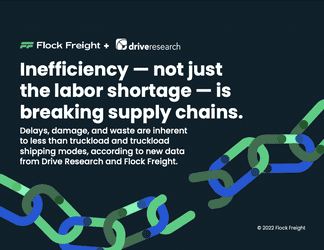Flock Freight Study Finds Traditional Freight Shipping is Inefficient and Costly, According to Shippers Across the US
96% of LTL shippers reported 1 to 4-day delays on shipments, and over 50% of truckloads are moving at less-than-max capacity
Flock Freight®, a technology company that is reinventing freight shipping with its patented shared truckload service, partnered with Drive Research to release its 2022 research study, “Inefficiency – not just the labor shortage – is breaking supply chains,” which reveals that shippers in the U.S. are struggling to ship over-the-road freight efficiently due to rising costs, shrinking size restrictions, underutilized trailer space, and delivery delays.
The COVID-19 pandemic set in motion an unprecedented logistics and transportation crisis, crippling supply chains around the world, and stretching shippers to the limit as consumer demand increased. In the continued wake of this crisis, driver shortages and port delays are often cited as the cause for ongoing supply chain disruptions, but a crucial piece of the puzzle is being overlooked: The trucks clogging roadways and dockyards are moving at less-than-maximized capacity.
“The supply chain issues we saw during the height of the pandemic continue today and act as proof that shippers and carriers are an essential piece in keeping the economy and our lives running,” said Oren Zaslansky, founder and CEO of Flock Freight. “These survey results – from shippers experiencing these disruptions first-hand – are very telling that traditional shipping methods are not enough to keep trucks running. Flock Freight’s shared truckload technology enables shippers to move their freight faster, cheaper, and with less damage than the traditional shipping methods that have so-far shaped our supply chain.”
Flock Freight’s survey of 200 transportation and logistics professionals found that the industry’s traditional shipping methods – partial truckload (PTL), truckload (TL), and less-than-truckload (LTL) – resulted in increased fees, shipment delays, and late deliveries. For all shipping methods, 100% of respondents reported that their freight arrived late in 2021 and was delayed between one and four days.
Other key findings (broken down by shipper challenges) include:
- Cost Inefficiency
- 1 in 2 shippers are paying for air in underutilized truckload shipments
- 100% of shippers incur accessorial fees, and 27% of them experience them often
- Accessorial fees are costing shippers on average $411,239 a year, with large enterprise shippers incurring closer to $900,000
- On average, $566 in OTIF (on-time-in-full) fees are charged per shipment, racking up to over $290,000 per year
- Delivery Inefficiency
- 100% of shippers had to remanufacture & reship goods due to damage, with over 1 in 4 needing to do so often
- 96% of LTL shippers experience delays between 1-4 days, with some even experiencing 5-6 day delays
- 1 in 3 shippers often wait to send a shipment until they can fill an entire truckload trailer
- Of the truckloads booked in 2021, over half (51%) were moving at partially empty
The full report can be requested here.
Category: Connected Fleet News, Driver Stuff, Equipment, Featured, Fleet Tracking, Fuel & Oil, General Update, Green, News, Products, Tech Talk, Transit News











